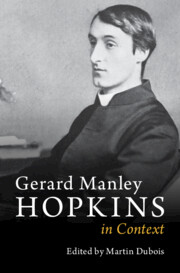Book contents
- Gerard Manley Hopkins in Context
- Gerard Manley Hopkins in Context
- Copyright page
- Contents
- Illustrations
- Notes on Contributors
- Note on Editions and Abbreviations
- Chronology
- Introduction
- Part I Places
- Part II Aesthetic and Cultural Contexts
- Part III Religious, Theological, and Philosophical Contexts
- Chapter 10 Tractarianism
- Chapter 11 Ancient Greek Philosophy
- Chapter 12 The Bible
- Chapter 13 Victorian Roman Catholicism
- Chapter 14 Jesuit Life and Spirituality
- Chapter 15 Scholastic Theology
- Chapter 16 Sacramentalism
- Part IV Nature, Science, and the Environment
- Part V Gender, Sexuality, and the Body
- Part VI Form, Genre, and Poetics
- Part VII Reception and Influence
- Further Reading
- Index
Chapter 12 - The Bible
from Part III - Religious, Theological, and Philosophical Contexts
Published online by Cambridge University Press: 16 January 2025
- Gerard Manley Hopkins in Context
- Gerard Manley Hopkins in Context
- Copyright page
- Contents
- Illustrations
- Notes on Contributors
- Note on Editions and Abbreviations
- Chronology
- Introduction
- Part I Places
- Part II Aesthetic and Cultural Contexts
- Part III Religious, Theological, and Philosophical Contexts
- Chapter 10 Tractarianism
- Chapter 11 Ancient Greek Philosophy
- Chapter 12 The Bible
- Chapter 13 Victorian Roman Catholicism
- Chapter 14 Jesuit Life and Spirituality
- Chapter 15 Scholastic Theology
- Chapter 16 Sacramentalism
- Part IV Nature, Science, and the Environment
- Part V Gender, Sexuality, and the Body
- Part VI Form, Genre, and Poetics
- Part VII Reception and Influence
- Further Reading
- Index
Summary
Before his conversion to Roman Catholicism, Hopkins acquired a copy of the Vulgate Latin Bible for future use and returned his copy of the King James Bible to his unhappy father. From a Bible-centred Protestant perspective, much of the doctrine on which he was to meditate as a Jesuit poet is non-scriptural, and could be described as Catholic accretions. This chapter reveals that Catholic versions of the Bible underwent revision down the centuries, as Protestant versions did, and that Victorian Catholics were not forbidden to read the Bible. A new Holy Catholic Bible is adorned with an image of the Blessed Virgin Mary in glory. The doctrine of the Immaculate Conception of the Blessed Virgin Mary was promulated in 1854, further widening the gap between Protestant and Catholic teaching. But for Hopkins, the unpublished laureate of the Blessed Virgin, the (unscriptural) Immaculate Conception lay at the heart of his faith.
- Type
- Chapter
- Information
- Gerard Manley Hopkins in Context , pp. 103 - 109Publisher: Cambridge University PressPrint publication year: 2025

